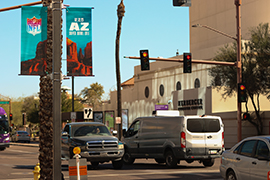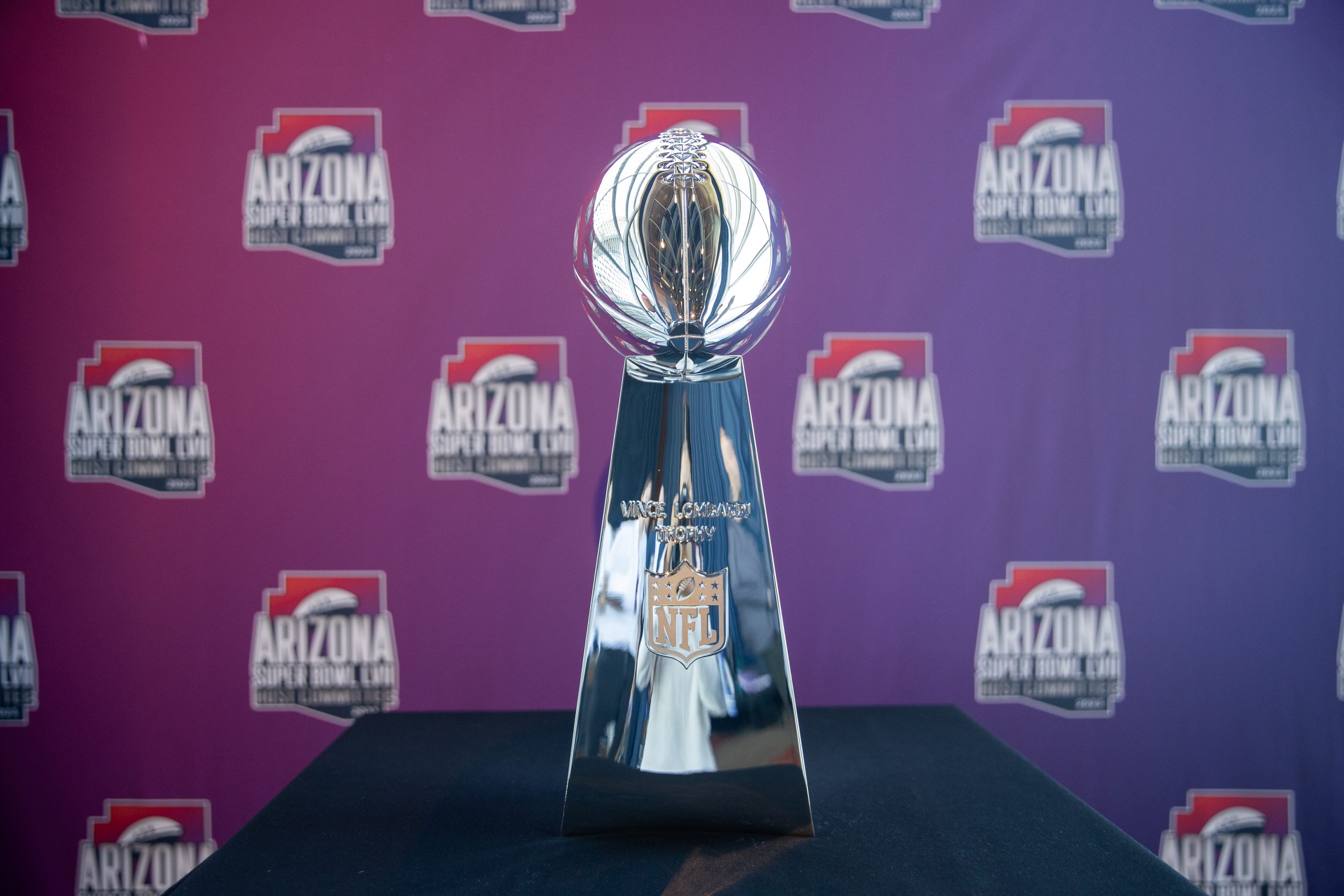- Slug: BC-CNS-Super Signs,920.
- 2 photos available (thumbnails. captions below)
By Alexis Waiss
Cronkite News
WASHINGTON – A Phoenix ordinance that let the Arizona Super Bowl Host Committee accept or reject signs around the “NFL Experience” zone downtown is an unconstitutional infringement of free speech rights, a Maricopa Superior Court judge ruled Thursday.
Judge Bradley Astrowsky also ordered the city to act within 48 hours on any sign application submitted by Bramley Paulin, the business owner who sued because he was not allowed to post commercial signs on property he owned near the heavily trafficked zone.
Even though the Phoenix City Council tried to fix the problem by changing the law last week, Astrowsky said the action came so late that, without a court order, the city could sit on Paulin’s application until “well after the Chiefs or the Eagles are handed the Vince Lombardi Trophy.”
Paulin called the ruling a relief, saying in a prepared statement Thursday that his court battle “never should have happened in the first place.”
“It’s wrong for the government to let the NFL and other private groups censor business owners like me, or any residents of the downtown area,” Paulin’s statement said.
A Phoenix spokesperson said that the city “has and remains committed to working closely with small businesses to provide the permits and licenses they need to benefit from the increase in visitors” who will be in town for the Super Bowl.
“This includes items such as food sales, signs, street and sidewalk vending, and other business opportunities,” the spokesperson said in an emailed statement Thursday.
Paulin thought he saw a business opportunity when Super Bowl planners announced that NFL-sponsored events would be held throughout the city, including one in Margaret T. Hance Park – across the street from a property he owns.
With those events expected to attract hundreds of thousands of people, Paulin said he hoped to sell advertising space on his building to brands like Coca-Cola’s Powerade. But court documents said Coca-Cola turned down his offer, noting that his property was in a city-designated “clean zone” where any signage needed to be approved by the NFL or the host committee.
That was the result of an ordinance passed in October creating a Special Promotional and Civic Event space for Super Bowl events, where signs not normally allowed could be erected for the duration of the event – as long as they were authorized by the host committee.
The clean zone, in place from Jan. 15 to Feb. 19, was established to “protect local businesses from ‘ambush’ or ‘guerrilla’ marketing attempts during the event period,” according to a fact sheet from Downtown Phoenix Inc.
But Paulin, backed by the Goldwater Institute, argued that the clean zone was unconstitutional because it restrained commercial speech and because it handed the power to restrict that speech to unelected, private companies like the host committee and the NFL.
In his ruling Thursday, Astrowsky agreed with Paulin and the Goldwater Institute that the clean zone ordinance was a prior restraint on free speech. He also said that giving the authority to restrict speech over to “an unaccountable third party was totally antithetical” to the limited government called for in the Arizona Constitution.
But Astrowsky last month issued only a temporary restraining order against the city, after it pledged to correct the law at its next council meeting.
The council on Jan. 25 revoked the Super Bowl Host Committee’s authority to approve signs in the clean zone. But Paulin’s attorneys said that did not solve the problem and Astrowsky agreed.
John Thorpe, the Goldwater attorney who represented Paulin, said that because it takes several weeks for the city to process use-permit applications, there would not be enough time to get city approval for signage for the Super Bowl. The only alternative, he said, would be for residents to go to the Arizona Superbowl Host Committee to ask if they could share the committee’s use permit for their applications.
That essentially keeps authority in hands of the NFL and the committee, making the revised law unconstitutional in its application, Thorpe said. Astrowsky concurred, saying the city created the problem “by enacting an unconstitutional resolution” and then waiting “to remedy their error when it was too late for (the) Plaintiff to apply to exercise his right to speech.”
Thorpe said Paulin’s hands have been tied so far when it comes to filing an application.
“Nobody would even talk to him about (it) at the time essentially, he couldn’t work out any of those details,” Thorpe said. “To do a signage application you have to put in details about the what type of sign do you want, how big is the sign, where’s it going to be located.”
Astrowsky’s order applies only to Paulin’s property. Under the order, Paulin will be able to share the host committee’s use permit for his sign application, which will then be judged by normal city standards. But Astrowsky said the city will have to make a decision within 48 hours of getting Paulin’s application.
The Arizona Super Bowl Host Committee did not respond to a request for comment on the order Thursday.
The ruling does not reverse clean zone regulations, but Thorpe said he hopes it will make other cities think twice before enacting clean zone ordinances that stifle First Amendment rights.
“This free speech victory serves as a warning to the city of Phoenix, and to all governments that cook up similar schemes: The Goldwater Institute will always fight to defend Americans’ free speech rights against government suppression,” an institute spokesperson said in an emailed statement.
For more stories from Cronkite News, visit cronkitenews.azpbs.org.
^__=
Web links:
_ Court order: https://www.goldwaterinstitute.org/wp-content/uploads/2023/02/Minute-Entry-Order-ruling-in-favor-of-Paulin230202.pdf
_ DTPHX fact sheet: https://dtphx.org/wp-content/uploads/2022/11/Clean-Zone-101.pdf
_ Council October calendar: https://www.phoenix.gov/cityclerksite/City%20Council%20Meeting%20Files/10-12-22%20Formal%20Results.pdf
_ Council January calendar: https://www.phoenix.gov/cityclerksite/City%20Council%20Meeting%20Files/1-25-23%20Formal%20Results.pdf
^__=
Signs announcing the Super Bowl can be seen all through downtown Phoenix, but the city had limited signs near game-associated entertainment areas – so-called “clean zones.” A court ruled Thursday that the law was an unconstitutional infringement on free speech rights. (Photo by Logan Camden/Cronkite News)
A Maricopa County Superior Court judge ordered Phoenix to act swiftly on an application for signs near a Super Bowl “clean zone,” saying he feared the Vince Lombardi Trophy, which goes to the Super Bowl winner, would have been awarded before the city acted otherwise. (Photo by Susan Wong/Cronkite News)

